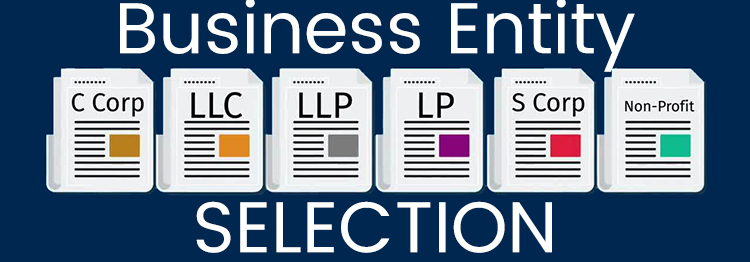Business Entity Selection And Setup
When you start or plan on expanding a business, many business owners wonder if they should form a business entity and, if so, which one is the best option for you. There is a vast amount of good information being offered to the general public whether from an accounting journal or the internet regarding the advantage of certain types of entities versus others. The number one reason for forming a business entity is to create protection from personal liability arising from your business’s activities.
It is clearly documented that up to 80% of businesses will not succeed and fail in their first 2 years. Most of these businesses, and probably yours, carry a higher level of risk for their owners personally. If you choose the wrong entity for your particular business, you are going to be personally liable if the business ends up failing. Do you want to expose your vehicle, house, and other assets? Moreover, the assets owned by your spouse and even their paycheck from a regular job could become vulnerable? Selecting the proper entity for your business prevents such terrible things from occurring. Most importantly, you can have better peace of mind knowing that the worst thing that can happen is losing your investment in the business, not your home, and other valuable assets.

Corporations
There are quite a few differences, but the key one is a tax issue. Basically put, "C" corporations are taxed on their revenues and you are then taxed separately on any money you take out of the corporation. An "S" corporation will pass through all taxes to the shareholders with the information being reported on your personal tax returns.
Regardless of your tax classification, a corporation is considered an independent entity from a legal standpoint. This independent status will act as a shield between the activity of the business and your personal assets. As a practical example, when Kmart filed for bankruptcy in 2002. The individual shareholders didn’t have to file for bankruptcy and lost nothing more than their investment in the stock of the company. When you form and use a corporation for your business activities it will have the same effect with your personal assets not being wiped out if the business fails.

Limited Liability Company
LLCs are similar to corporations but can be taxed as a partnership. In some states, the LLC can have either one owner or two. Regardless of the number, these owners carry the legal title of "member." The LLC provides a shield for your personal assets just like a corporation.


Partnerships
Unfortunately, many business owners form partnerships and don't even realize it. This happens when they go into business with another person. If you did not form a business entity, the law considers the business to be a partnership and treats it accordingly.
Partnerships can be dangerous for one core reason: a partnership does not deliver any protection from liability and, in many ways, opens the door to personal liability. Under long-established laws, most partnerships are classified as "general". Essentially this means that all the partners are contributing to the running and administration of the partnership business. This classification can have horrible results.
In a general partnership, each partner is equally liable for the debts of any other partner arising from the business. For instance, you and your partner go to an after-hours business dinner with a client. Your partner has some drinks and then a few more. If they get into an accident on the way home. Each of the business partners is liable for the damages incurred by the injured persons. That means even you! It does not matter even if you were not in the car, don’t own the car, never saw the car, and don't drink! It's time to pay up.
Partnerships are a perfect storm for disaster. Stay away from these at all costs or whenever possible.
Limited Partnerships
Limited Partnerships ["LP"] are easily the most misunderstood business entity selection type. A limited partnership is similar to a general partnership but it allows a number of partners to limit their liability by being limited partners. It is crucial to note that these limited partners are restricted to simply investing capital [cash, content, equipment] contribution to the partnership. They aren’t and cannot be involved in actively running the business. If they are, they lose any protection from the debt the partnership accumulated. Many limited partnerships end up with disastrous results. If you are committed to the idea of using a limited partnership, you must do so in combination with corporations. That particular strategy is well beyond the scope of this landing page, but feel free to contact us about any of your accounting needs.
Business owners should protect themselves by forming entities for their business activities. The biggest issue is identifying the structure that is best for your particular situation.
Have a project in mind?
See how we can work with you

There is a brief form at the bottom of the newsletter page where you can submit your email address to receive the latest accounting news as it breaks.
© All rights reserved, Romano & Associates